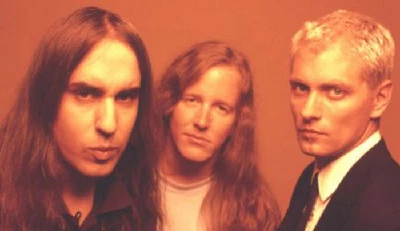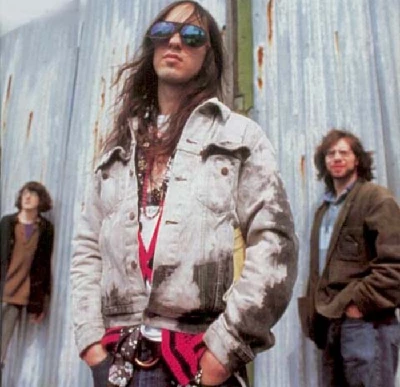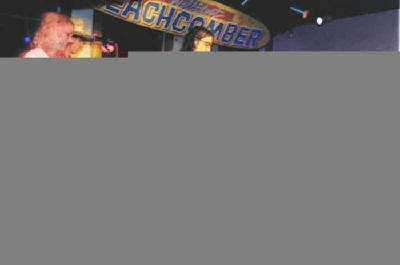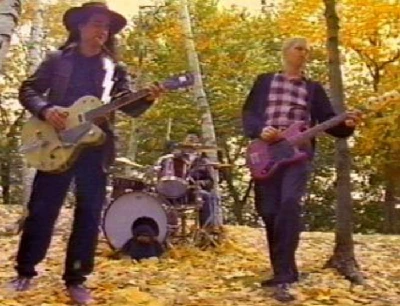published: 10 /
4 /
2005
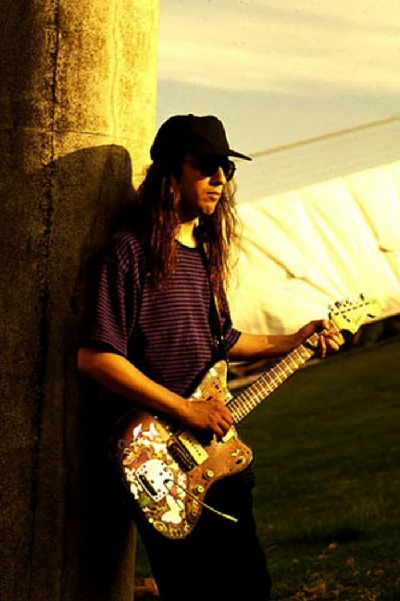
About to reform, Dinosaur Jr were one of the great guitar acts of the 89's, but fell apart in spectacular fashion after recording three classic albums. Frontman J Mascis talks to Mark Rowland about their traumatic break up and getting back together
Article
Communication. It’s one of the most important things in any kind of relationship. If you can’t talk about things, you can’t sort anything out.
Look at Dinosaur Jr, for example. Over the course of three albums, Dinosaur’s original line-up fell to pieces in spectacular fashion, with frontman J Mascis trying to smash bassist Lou Barlow’s head in with a guitar. Each of the band members, Mascis, Barlow and drummer Emmett Jefferson ‘Patrick’ Murphy III (known as Murph by most) were very good at getting at each other. They were also very bad at talking through their problems.
“We were all really young and didn’t know how to deal with things,” says J Mascis now talking to Pennyblackmusic, his speaking voice a slow drawl. “So we just made things worse for each other.”
Barlow and Mascis haven’t really spoken to each other since 1988, when Lou was kicked out of the band. Murph left Dinosaur in 1993. Finally, however, they seem to have sorted out their differences. As the first three Dinosaur records, ‘Dinosaur’(1985), ‘You’re Living all Over Me’(1987) and ‘Bug’(1988), have been re-released this year, the original line-up has reformed for a tour of the US and Europe.
“It’s just kind of slowly sorted itself out,” says J on the reformation. “I dunno. It just sorta took a long time for Lou to be less pissed off.”
This is far from a permanent reunion, however. Don’t expect any new Dinosaur Jr albums any time soon.
“It’s just a one off to promote the re-release of the records,” says J. “We’re not planning to do anything else after this, though I dunno. You never know.”
Dinosaur came together in Massachusetts, from the ashes of hardcore band Deep Wound. Mascis played drums in the band and Lou played guitar, with their friends Scott Helland and Charlie Nakajima on bass and vocals respectively. They adored hardcore punk, but were hardly rebellious (with the exception of Nakajima). Mascis’ mum even knitted him a Deep Wound sweater. The band played a few shows opening for more established hardcore bands and released an EP for Boston’s Radio Beat label. Mascis gradually started to write more songs for the band, and played on guitar on a track called ‘Video Prick’ on the EP and added a guitar solo to what was essentially a generic hardcore song. It was the first hint of things to come.
Deep Wound split in 1984, as Barlow and Mascis got increasingly bored with the formulaic hardcore scene and started getting into metal and jangly indie, two key elements to Dinosaur’s sound.
“Hardcore was a scene that died out,” Mascis says. “I was more into bands like the Birthday Party, while a lot of those bands fit into a certain formula. We looked into other sorts of music for inspiration.”
J had been writing songs on his own after Deep Wound split and played them for Lou to see what he thought. Barlow was blown away.
“They were fucking Brilliant,” Lou said in an interview with Michael Azerrad. “They were so far beyond.”
The songs were a mixture of all of J’s favourite music; indie, 60's and 70's rock, country, metal and art-punk. It sounded like no-one else, but Mascis shrugs it off as if it was nothing:
“I’d just rip off certain things that I liked; I would take something from the Stones or the Birthday Party. My voice is like Neil Young’s, I liked country, I liked the Replacements, and I would take things from them.”
Barlow was so in awe of J’s songs that he eagerly agreed to take up bass and took a job at a nursing home to buy one.
The band was originally called Mogo, with Nakajima on vocals and his friend Murph on drums. They played their first show in September, 1984. During the show, Nakajima tried to provoke the police at a nearby police station by going off on an anarchist rant. Mascis broke up the band the next day, already pissed off at Nakajima for continuously getting stoned at practices. Later on, he called Lou and Murph and asked if they wanted to form a new band without Nakajima. Mascis admits: “I was kinda too wimpy to properly kick him out the band.”
The ‘new’ band was called Dinosaur and quickly became notorious in Massachusetts as being unbelievably loud. Mascis felt the guitar was “a wimpy instrument” and played as loud as he could to try to get same sort of power out of the guitar as you could from drums. This gave the band a reputation, though it wasn’t a good one.
“We didn’t have any fans. We had Gerard Cosloy, but he already knew us. We had a few fans locally, but not many. Most people thought we sucked,” Mascis says.
Dinosaur soon got banned from most of the local venues. During a show in Boston, the soundman actually bottled the band. The plug was pulled on Dinosaur on more than one occasion.
Not that it put them off at all: “We were really confident about our sound when we started out. We were cocky kids, it didn’t really matter what anyone thought of us. We knew we were really good, just no-one else did.”
Gerard Cosloy knew it. Cosloy was a fan of Deep Wound when he was publishing a fanzine ‘Conflict’. He became friends with Mascis when they met at a hardcore show in Greenfield. When Cosloy started running Homestead Records in New York, he said that he would put out anything Mascis recorded, whatever it was. Mascis gave him ‘Dinosaur’.
The first Dinosaur record was recorded for $500. Mascis describes the recording experience as “A little weird. It was just us and a local sound man.”
‘Dinosaur’ is still quite punky in places, but it is far removed from standard hardcore thrash. For one, most of the songs on the album are three minutes plus, about three times the length of the average hardcore song. While songs like ‘Cats in a Bowl’ and ‘Does it Float’ had the pace of hardcore, they also featured country and indie guitar phrasing and in some places, even slide guitar.
The album isn’t perfect; some of the songs aren’t that memorable and the vocals are slightly muffled in places, but in general, it is a great sounding record, with ‘Repulsion’, ‘Does it Float’ and ‘Quest’ being obvious highlights.
At the time, however, most people regarded the band as a bit of a joke. Cosloy tried his best to promote the album, but only a few fanzines took notice. Then Sonic Youth caught one of their shows and were blown away, almost literally, by the force of the show.
Sonic Youth invited the band on a two week tour across the US. The band, big Sonic Youth fans, couldn’t believe their luck.
“It was really fun. That was our best tour I think,” says Mascis. “We drove around in Lou’s station wagon. We played about ten shows. Sonic Youth were one of our favourite bands, I really liked the record they’d just put out, ‘Evol’. We played a good show pretty much every night of that tour. We were all really happy on the way back home.”
Dinosaur’s new friendship with Sonic Youth seemed to focus the band on both their writing and playing. Mascis house-sat for Thurston Moore and Kim Gordon while they were on tour, which gave Barlow and Murph a chance to practice together and hone their technique: while Mascis was away, they could actually hear themselves play. J’s songs, meanwhile, were becoming more focused. The songs stopped being a mixture of influences and started becoming a fully formed sound. The band recorded some tracks with Sonic Youth engineer Wharton Tiers in New York. Lee Ranaldo sings back up on ‘Little Fury Things’. It was evident to those around them that Dinosaur’s second album was going to be special.
“‘You’re Living All Over Me’ was our peak I guess,” shrugs J. “We hadn’t really had any major problems up to that point, well, we had our problems, but they weren’t anything you couldn’t live with.”
Lou Barlow in particular was extremely excited by the new record and has described it as “wonderful”. He felt that he was the only member in the band who could hear how great the new stuff was, though he has conceded that it was probably because he was smoking a lot of pot at the time.
‘You’re Living All Over Me’ is a great 80's indie rock record. It fits together perfectly, the influences merge seamlessly, and every song is pretty strong. From the huge riff of ‘Sludgefeast’ to the upbeat, bass-driven ‘In a Jar’, the power and raw energy of the record jumps out at you. The guitar work is also phenomenal for a post-punk record, showing off a range of styles without resorting to self-indulgent fretting.
Barlow contributes two songs to the record. He was so in awe of Mascis song-writing that he became very critical of his own. He worked on ‘Lose’ for months before showing it to the rest of the band. Barlow’s other track, ‘Poledo’ hints at the direction he was heading in; a primitive tape recording which skips between acoustic strumming and distorted loops. The track is described in the album’s credits as being recorded “on two crappy tape recorders by Lou and Lou alone in his bedroom” This is possibly a sign that the other members wanted to distance themselves from the track.
Tensions started to mount between J and Murph during the recording of ‘You’re Living…’ As a drummer himself, J had a good idea of how he wanted the drums would sound and would practically dictate every drum beat to Murph, leading him to describe J as “a fucking Nazi”. Those tensions were still bearable at the time, but it wouldn’t last for long.
When Sonic Youth got hold of a tape of the ‘You’re Living…’ sessions, they sent it to SST, their label at the time. SST loved it and it wasn’t long before they offered to release the record.
For Gerard Cosloy, who was expecting to put it out on Homestead, the news that it was being released on SST was heartbreaking after he had championed the band so strongly. He took the decision personally and he and Mascis stopped being friends.
“Yeah, that was a shame. I never wanted to lose him as a friend. It was nothing personal,” Mascis says.
The decision to go with SST did make sense for the band. It was one of the biggest and best respected indie labels at the time, and could get the band better exposure. Also, the members of Dinosaur had wanted to be on SST for a long time. In fact, signing with SST was their main ambition.
“That was our only goal,” says Mascis. “Once we got signed to SST, we didn’t know what to aim for. I think that was the point where we started falling apart. We had nothing left to focus on.”
Without anything left to strive for and with more and more people starting to get what they were about, Dinosaur lost the unity that comes with struggling against close-minded audiences. Without that, it is possible that the members started to pick up on each other’s annoying habits.
Dinosaur set out on a US tour in the summer of ’87 to promote ‘You’re Living…’ Unfortunately, the album wasn’t released until the end of the tour due to a mix up with the label, so the band played to very small crowds. Band tensions also hit an all time high.
“That tour was the worst. Our record wasn’t out yet, then our van broke down and we were stranded with too much time on our hands, so we just started getting at each other,” J says.
They got at each other in some pretty strange ways. Barlow would put random things in his mouth and chew on them. This lead to an incident over Mascis’ cookie monster doll, when Lou was caught sucking on its Eyeball. Mascis was disgusted over the incident, but he wasn’t much better. Mascis would continuously put down the other members, especially Lou.
At one point on the tour, when Murph was driving and the others were asleep in the back, their van went off the road. When the others asked Murph what had happened, they could hardly believe his reply.
“He said he fell asleep deliberately, so he could ‘feel the road’,” J says. “It was so weird.” Murph denies the whole incident.
Their van broke down in Idaho, when the band was on their way home. They had to wait for parts and were stranded at a motel for a few days. Things started to get really bad.
“I remember tearing into Lou at one point. I really upset him. We were all young guys. We didn’t know how to deal with things and we could be pretty mean sometimes. I feel pretty bad about a lot of things I said and did back then.”
It was Mascis that pushed Murph over the edge. During an argument about where to lay out the mattresses in the motel room they were staying in, Mascis made a dig at Murph about his receding hairline and his sexual insecurities. Murph freaked out and trashed the room.
It wasn’t much of a surprise that their next record, ‘Bug’, wasn’t quite as inspired as ‘You’re Living All Over Me’. It didn’t have the same energy as its predecessor, or the same consistency. You can also tell that Dinosaur, who had by now added the ‘Jr’ to their name for legal reasons, weren’t communicating at all as a band.
“‘Bug’ is my least favourite of all our records,” says Mascis. “I like some of the songs but, I dunno, I guess I really don’t like the vibe of it.”
That’s not to say it isn’t a good album. ‘Bug’ has some classic tracks, such as ‘Freak Scene’, ‘Yeah We Know’ and ‘Budge’. Essentially, however, it was a J Mascis solo album.
“I had to do a lot on that record. It was a lot different from when we recorded the other two. I really wanted the others to contribute, but they just came in, played their parts and left. Lou had his Sebadoh thing and his girlfriend; he didn’t really have time for the band anymore.”
Barlow’s aforementioned girlfriend, Kathleen Billus, and the blossoming of his Sebadoh project, gave him a lot more confidence in what he was doing. Having another output for his songs allowed him to distance himself from the band even more.
Mascis was getting increasingly frustrated with Barlow. The track ‘Don’t’ on ‘Bug’ is a harrowing example of the breakdown of the pair’s friendship. It’s a five minute dirge of metallic noise, over which Barlow screams “Why don’t you like me?” repeatedly. Barlow apparently screamed so violently while recording the song that he coughed up blood afterwards.
Mascis admits that it was a bit twisted to have Barlow sing those words, but also points out that he wasn’t made to do it.
“It was a shame really. Me and Lou got on really well musically, we just didn’t in any other way.”
The band went on their second tour of Europe to promote the album. In Holland, tensions between Lou and Murph got to a strange point. The two were arguing about something, but by that time it wasn’t uncommon. During the night, Barlow walked past Murph’s bed to get some extra sheets. Murph started growling and, still asleep, started moving towards Lou.
“It was so weird,” says Mascis. “He was walking at him like he was going to kill him, but he woke up once he got there.”
The original Dinosaur came to an end during the ‘Bug’ tour of the US. Barlow was becoming increasingly confident and started speaking his mind a lot more. This was getting on Mascis’ nerves. “I started to realise that I really didn’t like Lou,” he says. What annoyed him even more was Barlow’s improvised, Sonic Youth inspired bass-drones that now peppered their shows.
At a show in Naugatuck, Connecticut, Barlow started making feedback with his bass halfway through ‘Severed Lips’. Mascis snapped.
“I kept thinking; ‘Murph’s gonna hit Lou,’” he says. “Then after a bit I thought; ‘Murph’s not gonna hit Lou, I guess I’ll have to do it.’”
Mascis ran at Lou and repeatedly tried to hit him with his guitar. Lou blocked the blows with his bass. After a while, Mascis stormed offstage. Murph has said that he felt like beating them both up, but instead walked offstage. Barlow raised his fists in triumph, feeling that he’d finally been able to get at Mascis, his perceived tormentor. Barlow persuaded the others to finish the set. No-one said a word on the way home.
“I didn’t talk to Lou at all once that tour finished,” says J. “He was just driving me crazy.”
That was the last straw for Mascis. He decided Lou was out the band. J and Murph went to Lou’s house to tell him the news. Murph did most of the talking for both of them. By the end of the talk, they realised, however. that Lou was under the impression that the band was breaking up. They didn’t correct him, even though they’d booked an Australian tour and asked Donna Dresch, formerly of the Screaming Trees, to play bass for them.
“It was strange,” says Mascis. “He didn’t wanna quit the band, but he wasn’t really enjoying it anymore. I don’t think he even considered leaving an option. Either we were a band or we weren’t.
“I think to him we were like a family. We were stuck with each other, even if we didn’t get on. We either broke up or we kept going, I don’t think he thought he could get kicked out.”
Lou found out that the truth though a mutual friend. Mascis and Murph came round for a second time and had everything out.
Barlow felt extremely betrayed by his former bandmates. He tracked them down the next day and laid into them, letting out everything that was on his mind. “That was pretty awkward,” Mascis admits.
Barlow’s anger at being kicked out of the band gave him plenty of inspiration for many Sebadoh songs. One of the least subtle digs was called ‘Asshole’ and was released as a single. Mascis never really paid any attention to them.
“I was already bothered by him, so his songs didn’t bother me. I knew he was just blowing off steam.”
He couldn’t ignore Lou, however, when he sued for $10,000 worth of royalties from the first three records.
“I did not like that at all. I didn’t owe him anything; we didn’t make any money off those records. I hated having the law involved with the band. I didn’t like the law involved in anything.”
The long-running feud seems to have finally come to an end, however. It must have, if the two can agree to play shows together for the first time in 17 years.
“He’s said a lot of stuff recently in interviews that suggests he sees it more for what happened rather than just pointing the finger or whatever,” says Mascis.
Whether the pressures of the road will get to the three of them this time round is yet to be seen. The members of the original Dinosaur are older and wiser, and it’s quite possible that the tour could close the door on what happened before.
“It would be great if we all really get along,” Says Mascis. “We’ll just have to see how it goes I guess.”
Band Links:-
https://www.dinosaurjr.com
https://www.facebook.com/DinosaurJr/
https://twitter.com/dinosaurjr
Picture Gallery:-
